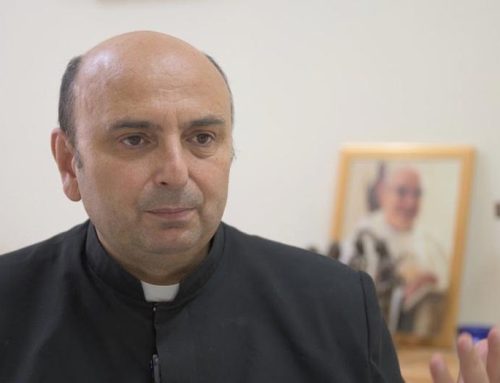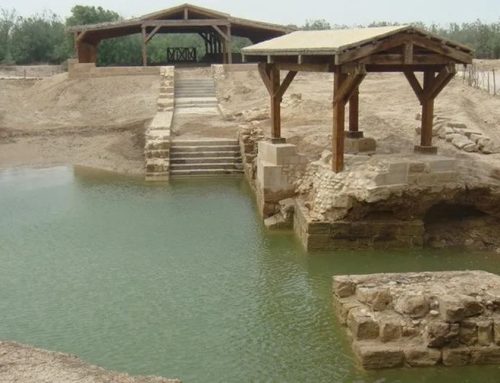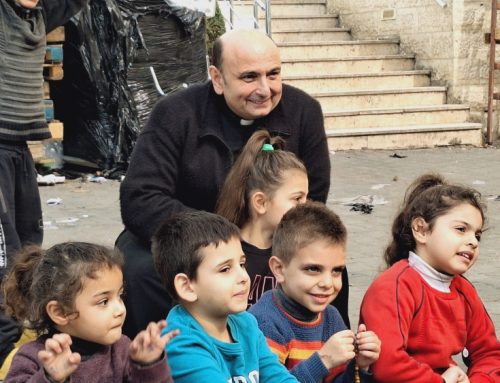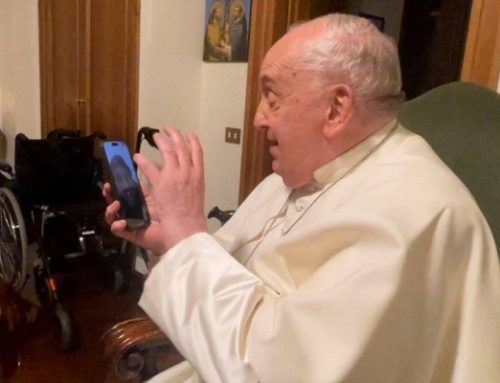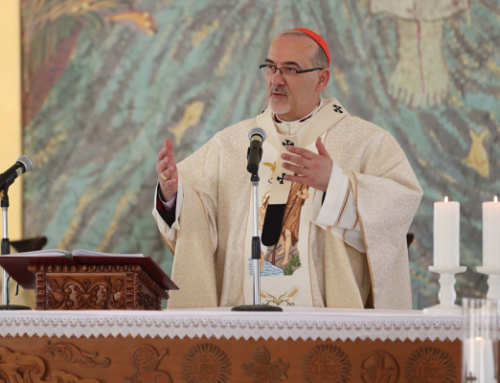At first glance, Father Ibrahim Alsabagh can seem pretty much like hundreds of thousands of other Catholic priests who work in parishes all around the world. He’s pastor of the Cathedral of Saint Francis of Assisi, where he says Mass, hears confessions, baptizes kids, marries couples, and all the other ordinary pastoral doings which make up the warp and woof of Catholic life everywhere.
Yet upon closer examination, there’s nothing ordinary about him at all – because his parish happens to be in Aleppo, Syria, where the humanitarian and spiritual aid provided by Alsabagh, a member of the Franciscan Custody of the Holy Land, is often about the lone consolation amid a violent, seemingly endless nightmare.
Over the eight years of Syria’s bloody war, estimates are that some 13,500 people in Aleppo have died and some 23,000 have been injured. Most of the rest have fled, leaving one of the oldest continually inhabited settlements on earth, and for eight years Syria’s thriving commercial capital, basically gutted – little more than a “village,” as Alsabagh puts it.
The 47-year-old Franciscan recently was in Rome to present his second book on Aleppo, The Morning Comes: Aleppo, Syria. Repair the House, Heal the Heart. It describes the state of the city since 2016, including efforts at material reconstruction and healing of people badly scarred by conflict.
During his time in Rome, Alsabagh had an opportunity to meet with Pope Francis and present him with a copy of the book. He spoke with Crux the day after that meeting.
Crux: You met Pope Francis yesterday. What was that meeting like, and what did it mean for you and the people in Syria you work with every day?
Alsabagh: Really, it was something amazing. Yesterday I went there to present to the Holy Father my second book about Aleppo, called The Morning Comes. They’re chronicles about the situations of suffering, but also of hope in Aleppo.
It was amazing, first of all because the pope had not been informed about what I was bringing to him. I began to say, ‘Holy Father, do you remember the first book you read during your spiritual exercises in Lent last year? As the parish priest of Aleppo, I’m bringing you the second volume speaking about our suffering and our hope.’
When I said, ‘parish priest’ and ‘Aleppo’, I saw a big smile on his face. He looked to me with tenderness, and I felt a lot of love in his heart and also a lot of interest to hear more about the situation as a population and as a church. It was clear that he’s praying every day for us. I explained to him something very quickly about the difficulties in which we’re living, and the hope that will peace will arrive again there.
After that, humbly, I asked him to put his hand on my head and to bless me. He did it, with a lot of affection, and I thanked him for everything he’s doing, not just for Syria but for all the world.
Things in Syria, unfortunately, remain very difficult. You spoke about the need for reconstruction. What’s that situation like, and what work are you doing to try to help these people?
Surely, the situation is extremely bad now after eight years of this conflict. We still have missiles falling in the western part of Aleppo, in two or three neighborhoods in that area of the city. Always, they bring death and terror in the hearts of many, many families.
When I look at the situation in Aleppo today, it’s definitely not like it was in the past. It used to be like Milan in Italy, from an economical point of view. Once, Aleppo was responsible for 60 percent of the industrial production for all of Syria. Today, it’s transformed into a small village only where there’s a terribly high unemployment rate, perhaps as much as 70 or 75 percent of people are living without work.
In this situation, you can imagine there’s also a lot of hunger. Many people aren’t able to find a piece of bread for their children. A young man who has a family and a small child told me, ‘Father, I have three jobs day and night, I work a lot, but I still don’t have enough money to buy bread for my child.’ The people are dependent on the humanitarian help we’re providing.
You know, in Syria, especially in Aleppo, we the local church, especially the local community of the Franciscan friars, have been present in the Middle East for 800 years, with many sacrifices along the way, helping the poorest of the poor. We’ve done a lot during these years of the crisis.
Right now, we have 50 humanitarian projects for emergencies, such as the distribution of food boxes every month to thousands of families. We also offer health-care assistance for thousands of persons every month.
On the other hand, we also have many reconstruction projects. For example, we’ve rebuilt 1,200 houses since 2016, and we helped 400 persons to find work in order to be help people move from dependency to independence in terms of their economic life. We’re doing a lot in all fields, making many sacrifices and helping not only Christians, but also Muslims.
However, we also feel that the work needed is bigger than what we can do as a local church. We have many difficulties, many necessities, that we see in the society today, but we don’t have the economic strength to do what’s needed to help these people.
In terms of the difficulties, what would you say is the main challenge you’re facing right now in ministering to the people in Syria?
The biggest challenge is to have peace in the heart. I’m so sad because of the development of events in Syria, and the whole region. I’m talking, for example, about the exchange of missiles that happened in the south of Syria ten days ago. It was a sign for all the people in Syria, especially in Aleppo, that the war isn’t finished and another stage of the crisis will be present for many, many years, and perhaps the story of war won’t have an end in Syria.
Do you fear this means that people, maybe especially Christians, will leave the country?
We lost two-thirds of our population in the first five years of the crisis. Now, we feel that after this event, there’s a big tendency in many ways to try to escape and to leave Syria definitively. That’s especially true for the minorities, because the reaction of the minorities is always passive. They look to escape, always, when they don’t feel safe in a society.
With this instability of the situation, they quickly think about trying to escape outside. We have this danger, with the Christian presence in the Middle East in general, including in Aleppo. We have many questions about our future, not only as the Christian minority, but for all the minorities. That’s not just the case for Aleppo, but, I repeat, all the Middle East.
It’s related to how the international community will respond to this crisis in Syria. We know today the solution is not in our hands as Syrians, the key is outside in the big countries of the world. Because of that, I ask with all my heart that these countries find a solution for us, for this crisis. It’s international, so they can find a solution that allows us to live in a secular Syria, with respect for diversity, to find the place in our country where minorities can be respected, and human rights respected.
We want every person in Syria to be able to share in the common good. The decision is in the hands of many counties around the world, and I hope to see a will for peace expressed in the decisions they make about Syria.
What can Christians around the world do to support the Christians in Syria?
First of all, I always ask on my journeys for prayer, because I deeply believe in the strength of prayer. In terms of our mission, as the Franciscan custody of the Holy Land, we have a long history of service to the Middle East over centuries, with 2,000 martyrs over eight centuries. Everything we do and everything we’re able to face, including my mission in Aleppo, happens because so many people are praying for us. To rebuild peace in the world, we need prayer.
Second, I say, follow the inspirations of your heart. If every one of us were to follow the inspiration of the Holy Spirit, we will arrive quickly, without a big organization, at peace in the world, and we’ll find a solution to many, many crises.
On the other hand, we also need material help. Following the inspirations of the heart, I hope we’ll find the necessities to help th poor and the victims of conflict to allow them to live in dignity.
Claire Giangravè
Source: cruxnow.com


